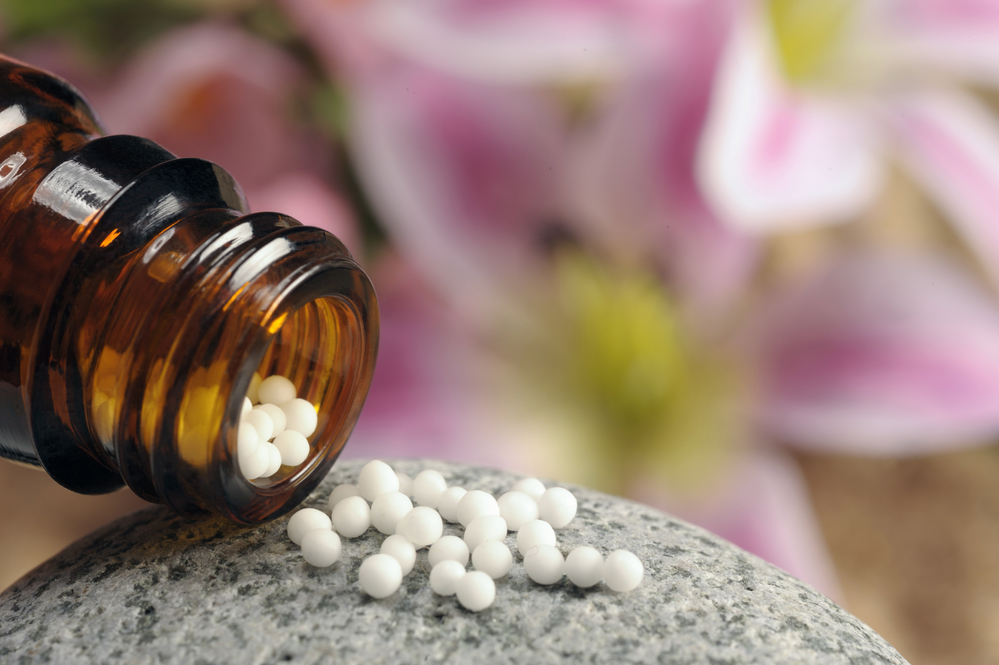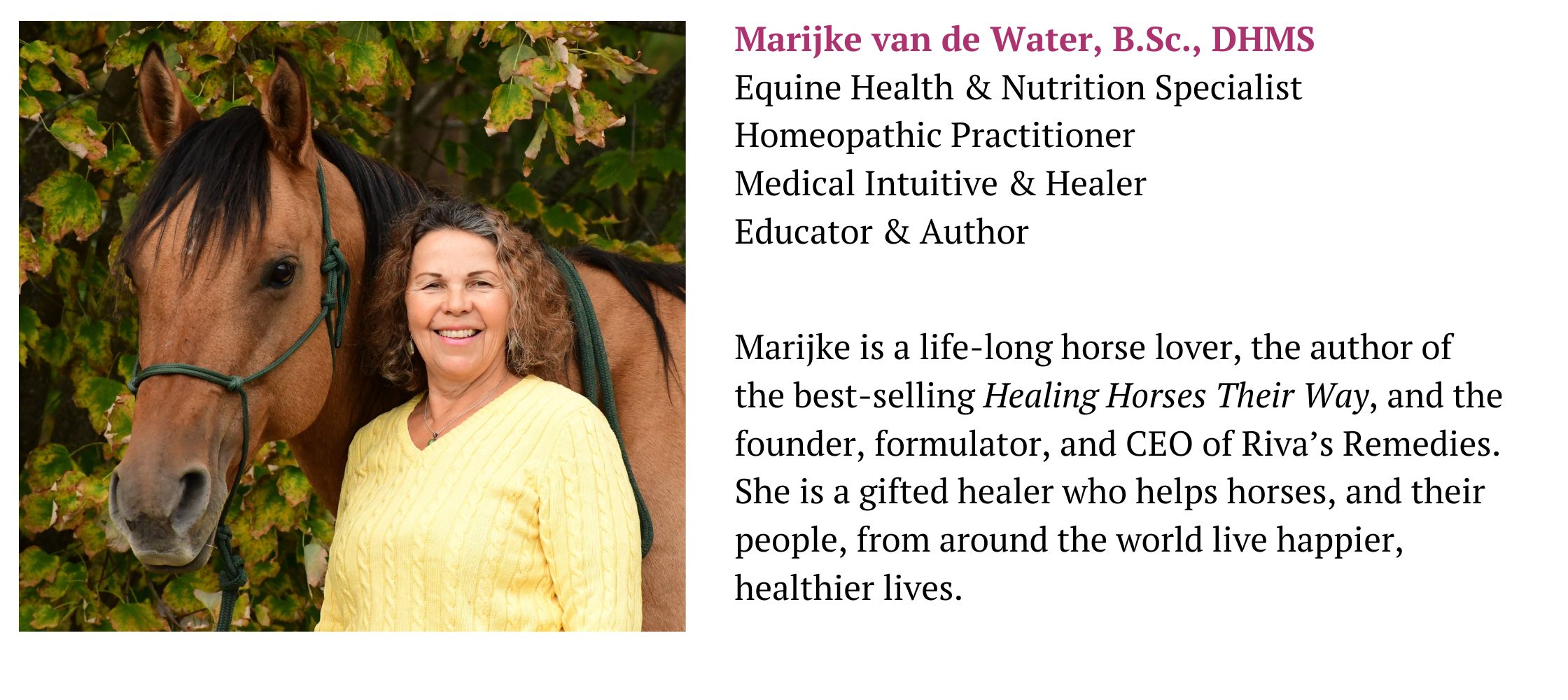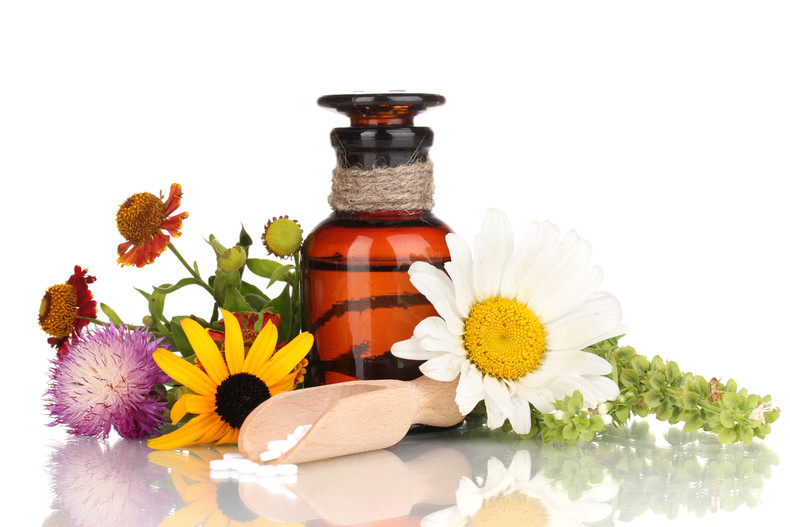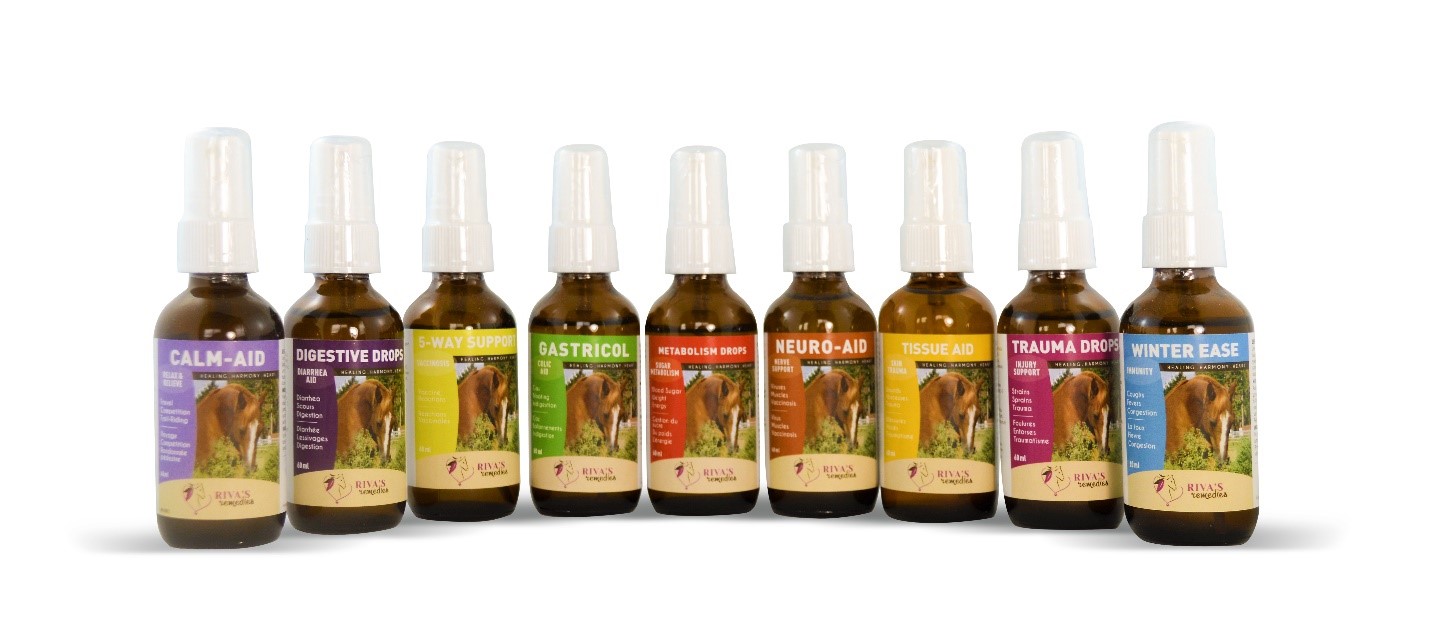Welcome back to my two part series on Horses & Homeopathy. In Part I we learned about what homeopathy is and how it works. We discussed the difference between homeopathic medicines and pharmaceutical drugs, where homeopathy stands in the health industry today, and the studies that are available on homeopathy. The many benefits of homeopathy were outlined including effectiveness, safety, minimal to no side-effects, environmental cleanliness, and no animal testing.
Now, we are ready to take a more in-depth look at when to use homeopathy, the different forms of homeopathic remedies, potency and dosage, as well as how to select and administer remedies.
When to Use Homeopathic Remedies
Homeopathic remedies can be used for virtually all health conditions, including injuries, inflammation, colic, flus, colds, fevers, skin conditions, respiratory problems, allergies, infections, colic, indigestion, hormonal imbalances, anxiety, and behavioural issues. Homeopathic remedies are safe for all breeds and all ages from the new-born foal to the 35-year old senior.
Homeopathic remedies are suited for both acute and chronic conditions but for those people who are using homeopathy at home and in the barn it is best applied to acute or recently occurring issues since these are more easily resolved without the intervention of other health modalities. Homeopathic medicines can be very fast acting, and improvements are often felt within one to two minutes of administering the correct remedy.
Potency
Potency refers to the strength of the homeopathic remedy. The most common potencies available are a 6C, 30C, 200C, or 1M. Potencies of 30C or lower are called low-potency remedies or medicines, and potencies of 200C or higher are considered high-potency medicines. The C stands for centesimal or one hundred.
Homeopathic remedies are prepared in professional laboratories using a complex process. A 6C dilution is made by mixing one part of the original mother tincture with 99 parts of water or alcohol. Then the next dilution uses one part of this mixture added to another 99 parts of water and so on until the process has been repeated 6 times at a dilution of 99 to 1 each time. For a 30C potency the process would be repeated 30 times and for a 200C the process would be repeated 200 times. However, the key to manufacturing potentized homeopathic remedies is the method of succussion. This means that between every dilution, the mixture is “succussed” or vigorously shaken. The succussion process is how the essence of the remedy is released into the dilution.
The conundrum for chemists who investigate homeopathy is that the strength of the remedies increases with the number of dilutions. In other words, the more dilutions that are prepared for one remedy the more dilute the remedy becomes; but the stronger the effect is on the condition of the body. This can be explained by the concept that the homeopathic preparation is not relying on an increase of molecules to generate potency; rather it is building strength through the vibration in the preparation each time that it becomes more dilute. Thus, the vibrational or energetic frequency increases with the number of times a remedy is succussed.
Lower potencies cover a wide range of symptoms and can be effectively used in the home and barn. Generally, the lower the potency the more often it can be repeated as needed. As a rule, unless otherwise instructed, discontinue the remedy as soon as symptoms improve. If symptoms reappear, repeat the remedy and use as needed. If the symptoms do not improve after 2-3 doses discontinue the remedy and choose another one that is better indicated for the current symptoms.
For more severe or chronic problems, the higher potencies are a better choice. But higher potencies should not be repeated as often. This is because the benefits or effects of even just one high potency homeopathic remedy can last for months or even years. Higher potencies are also able to stimulate healing aggravations, so it is better to use these when working under the guidance of a professional homeopath.
Form, Dosage & Administration
 Homeopathic remedies are available in small white sugar tablets, granules, or pellets, as well as in a liquid form which can be syringed, sprayed, or medicine dropped. Homeopathic medicines can also be used topically in the form of an ointment or liniment.
Homeopathic remedies are available in small white sugar tablets, granules, or pellets, as well as in a liquid form which can be syringed, sprayed, or medicine dropped. Homeopathic medicines can also be used topically in the form of an ointment or liniment.
Dosage refers to the quantity of the remedy that is given at any one time. For example, if using a remedy in the form of pellets one dose for a horse is 5-6 pellets. If using a liquid form give ½ tsp mixed with a small amount of clean water and drop or syringe into the mouth. The Riva’s Remedies homeopathic remedies are liquid combination remedies which are in a convenient spray bottle where 5-10 sprays can be gently sprayed directly into the mouth.
Pellets and liquids should be administered directly into a clean mouth without food, otherwise the essence of the remedy may be absorbed by the food rather than the mucous membranes. To administer homeopathic remedies, pellets can be put inside the lip or into the mouth or offered on the bottom of a clean pail or dish for them to lick up. This works well when they are licking the bottom of the dish after finishing their feed or their mash. You may also dissolve the pellets in a small amount of water and syringe into the mouth.
If inserting the pellets directly into the horse’s mouth wait until the pellets have dissolved or chewed in the mouth, then follow it up with a little treat and they will look forward to their “medicines” every day. For horses that cannot be handled or have not been trained to accept things by mouth you may also add the pellets or liquid spray to 1-2 litres of drinking water and allow them to drink it throughout the day.
Homeopathic remedies should be stored away from sunshine, strong electrical fields such as computers, refrigerators, stoves, or other appliances, and strong aromatic substances such as essential oils. It is also not advisable to store homeopathic remedies near healing crystals as the different vibrational fields may interfere with one another.
Selecting Homeopathic Remedies
Homeopathic remedies are chosen according to the individual set of symptoms as expressed by each person or animal. Remedies are not prescribed according to a disease label. It is the symptoms which show us the individual expression of each horse. So, in order to select the correct remedy. we need to know what sort of symptoms the affected horse is experiencing.
For example, say you want to help a horse who is suffering pain and stiffness in the lower back. There are several homeopathic remedies that could help this condition but first we need to know how this particular horse is experiencing the condition. Is s/he feel better when walking, better when standing still, or prefer to lie down? Does s/he flinch to the touch or enjoy a massage? Does the back feel hot or swollen? Does s/he get irritable with pain or does s/he seek out the company of the herd for reassurance? Does the weather affect her well-being? Here are three examples then of possible remedies.
Arnica Montana (leopard’s bane) is one of the most common remedies for symptoms due to injuries or falls – past or present. It is also very useful for bruising. It eases the pain and soreness from over-use or from any injury which involved mental strain or shock. The back tends to be sore after over-exertion and symptoms are worse after motion, any kind of touch, and damp cold. Arnica horses feel better when lying down or standing with their head low.
Bryonia (wild hops) would be a remedy to consider if your horse is very stiff, feels pain with the least movement, and seems better with rest. The pain is usually worse on the right side, worse in hot weather, and improves with hard pressure rather than light touch which may irritate her. S/he may be very irritable, abnormally hungry, or very thirsty.
Rhus-Tox (poison ivy) affects tendons (connects muscles to bone) and joints which have been strained. It is an amazing remedy when horses experience relief with movement but are worse from standing still and stiffer after resting. They may therefore be very restless when standing as they keep changing position or stretching. They often get relief from continued walking. Rhus-Tox can also be of value after surgery where the fascia has been traumatized or scarred. Rhus Tox horses feel worse from wet, rainy weather and better from warm, dry weather.
Combination Remedies
Single remedies are highly effective but not everyone is able to take the time to observe the symptoms and match them to the correct remedy. This is especially true in urgent cases or cases where the symptoms are more complex, subtle, or are difficult to observe to the untrained eye. For this reason, Riva’s Remedies offers homeopathic formulations containing multiple remedies to help address common problems:
- Enviro-Ease – Supports the immune system and helps stabilize respiratory conditions in horses with breathing problems due to inhalant allergies.
- Metabolism Drops – Supports normal blood sugar levels and healthy metabolism. Balances excess appetite and encourages weight loss.
- Calm-Aid – Promotes calm in horses with tension, stress, and restlessness. Use for handling, trailering, trail-riding, showing, and herd anxiety.
- Digestive Drops – Promotes healthy digestion in horses with chronic diarrhea. Supports digestive processes and absorption.
- Winter-Ease – Maintains a healthy respiratory system in horses with symptoms due to colds and flus including fevers, cough, and congestion.
- Tissue Aid – For internal use to support skin and tissues in affected horses. Also maintains eye and ear health in cases of inflammation and irritation. .
- Trauma Drops – Promotes mobility and flexibility for muscles, joints, bones, and tissues. Bruises, swellings, stiffness, or trauma.
- Gastricol – Maintains digestive comfort in horses with gas and bloating. Supports healthy gastrointestinal function and liver detoxification.
- Neuro-Aid – Supports a nervous system affected by bacterial or viral toxins.
- 5-Way Support – Supports the immune system, liver, and nervous system in horses with acute or chronic reactions to vaccines.
- Vitex Plus - Supports hormone balance and the immune system. Promotes normal hair growth, shedding, body temperature, and energy levels. Maintains healthy pituitary and adrenal function. Combines well with the Metabolism Drops.
Homeopathy In The Barn
Homeopathy is an invaluable tool in the health kit care for both the home and the barnyard. It provides an effective, safe, and very convenient option for many common health conditions. Millions of people and their animals from around the world have benefited from the remarkable properties of this quiet energy medicine. As it continues to enjoy increased popularity more people as well as practitioners are choosing it as a primary health care option. Combined with good nutrition and an appropriate diet our horses are looking better than ever!



